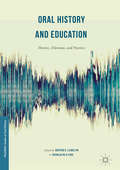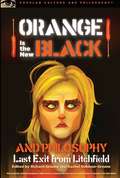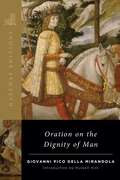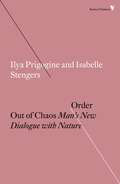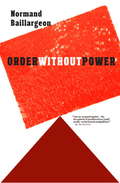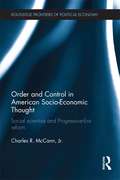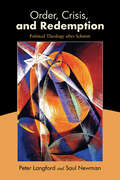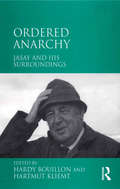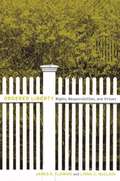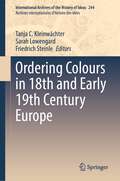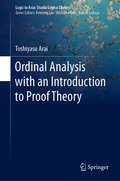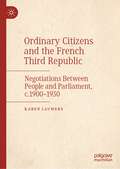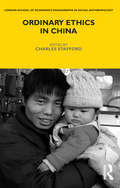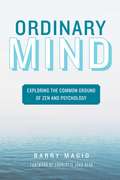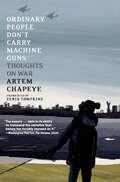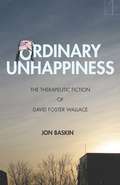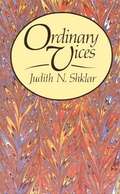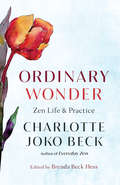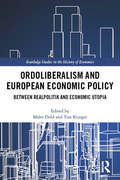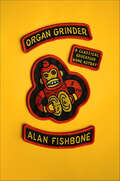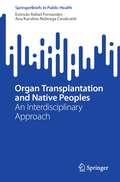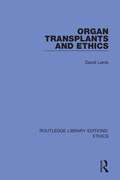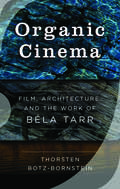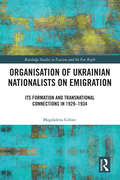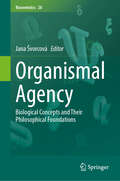- Table View
- List View
Oral History and Education
by Kristina R. Llewellyn Nicholas Ng-A-FookThis book considers if and how oral history is 'best practice' for education. International scholars, practitioners, and teachers consider conceptual approaches, methodological limitations, and pedagogical possibilities of oral history education. These experts ask if and how oral history enables students to democratize history; provides students with a lens for understanding nation-states' development; and supports historical thinking skills in the classrooms. This book provides the first comprehensive assessment of oral history education - inclusive of oral tradition, digital storytelling, family histories, and testimony - within the context of 21st century schooling. By addressing the significance of oral history for education, this book seeks to expand education's capacity for teaching and learning about the past.
Orange Is the New Black and Philosophy
by Richard Greene Rachel Robison-GreeneThis collection of eighteen chapters by talented philosophical minds probes some of the many lessons to be learned from Orange Is the New Black (mostly the addictive Netflix comedy-drama but with some attention to the best-selling real-life book by Piper Kerman). The show and the book that inspired it both dramatically highlight the troubling, stressful situation of millions of incarcerated Americans. How do the show's shower scenes shed light on the classical mind-body problem? How can we make our lives meaningful when our options are curtailed by authority? What does it mean to manipulate someone, and why is it bad? What can we learn about the peculiarity of human beliefs from Pennsatucky's notion of the gay agenda? Is Litchfield Prison a preparation for life outside-or just a scale model of life outside? What could the governors of Litchfield learn from Jeremy Bentham and his panopticon? How is it that even in prison we find ourselves condemned to be free? Why is one of the worst things about prison being forced to see who and what we really are? It so happens that life in prison is absolutely full and overfull of philosophical implications. Orange Is the New Black and Philosophy stays close to the characters and scenes of the TV show, applying insights from ethics, existentialism, metaphysics, epistemology, and political philosophy. The book is aimed at thoughtful fans of this amazingly fine TV show, who want to learn more about its disturbing issues.
Oration on the Dignity of Man
by A. Robert Gaponigri Giovanni Pico MirandolaThis translation of Pico della Mirandola's famed "Oration," hitherto hidden away in anthologies, was prepared especially for Gateway Editions, making it available for the first time in a single volume.The youngest son of the Prince of Mrandola, Pico lived during the Renaissance--an era of change and philosophical ferment. The tenacity with which he clung to fundamental Christian teachings while crying nut against his brilliant though half-pagan contemporaries made him exceptional in a time of exceptional men. While Pico, as Russell Kirk observes in his introduction, was an ardent spokesman for the "dignity of man," his devout nature elevated humanism to a truly Christian level, which makes his writing as pertinent today as it was in the fifteenth century.
Order Out of Chaos
by Ilya Prigogine Isabelle StengersA pioneering book that shows how the two great themes of classic science, order and chaos, are being reconciled in a new and unexpected synthesis.Order Out of Chaos is a sweeping critique of the discordant landscape of modern scientific knowledge. In this landmark book, Nobel Laureate Ilya Prigogine and acclaimed philosopher Isabelle Stengers offer an exciting and accessible account of the philosophical implications of thermodynamics. Prigogine and Stengers bring contradictory philosophies of time and chance into a novel and ambitious synthesis. Since its first publication in France in 1978, this book has sparked debate among physicists, philosophers, literary critics and historians.
Order Without Power
by Normand BaillargeonWith the rise of the global protestor--from Arab Spring to the Occupy movement--the term "anarchist" has been littered throughout mainstream media as never before. But just as frequently, its definition is skewed or left wanting: anarchists are painted as nihilists, supporters of chaos, or even terrorists.In Order without Power, an informative primer, Normand Baillargeon thoroughly defines anarchism and recounts its long history. In outlining the forerunners of this movement, he illuminates the differences between collectivists, federalists, communists, syndicalists, and further strains such as anarcho-feminism, pacifist anarchism, and religious anarchism. With sharp examples and concise, lively language, Baillargeon describes the contributions from early anarchists like William Godwin, Max Stirner, Pierre Joseph Proudhon, Mikhail Bakunin, and Pierre Kropotkin, through Noam Chomsky, as well as the uprisings, struggles, revolts, and revolutions that tested or expanded the theories. From the International Workingmen's Association to Haymarket, from the Russian Revolution to May 1968, Baillargeon unpacks anarchism's position on various issues and reveals this political theory's vibrant heart: anti authoritarianism, or the rational and conscious refusal of any form of illegitimate authority and power.
Order and Control in American Socio-Economic Thought: Social Scientists and Progressive-Era Reform
by Charles McCannThe Progressive Era is generally regarded as a period of extraordinary social, political, and economic change, affecting virtually every aspect of American life. In the last decades of the nineteenth century, American social scientists, drawing on their experiences with the German social welfare system, became increasingly interested not merely in identifying problems, but in prescribing means by which to effect social change. This book is an effort to identify the various influences upon critical thinkers, and to examine their approaches to solving the social problems of the time.
Order, Crisis, and Redemption: Political Theology after Schmitt
by Saul Newman Peter LangfordRecent events, such as the COVID-19 pandemic, the invasion of Ukraine, the rise of right-wing populism, the growing economic inequality and political instability, and the climate emergency, are indicative of the decomposition of the global liberal democratic order. Order, Crisis, and Redemption is a critical reflection on the limitations of Carl Schmitt's political theology, an attempt to think, with and beyond Schmitt, about the parameters of this crisis. Through a sustained critical engagement, ranging over Schmittian texts, including the lesser known, from the 1920s to the 1970s, the book elaborates three main themes that preoccupied Schmitt: order, crisis, and redemption. In times of crisis, as with the one we are currently experiencing, we are faced with the dilemma of either shoring up the current political and legal order—through ever more authoritarian measures—or radically transforming it. Redemption, in the full theological sense of the word, thus implies the possibility of a new understanding of ethics and politics, aimed at creating a more just world.
Ordered Anarchy: Jasay and his Surroundings
by Hartmut KliemtAnthony de Jasay's work has been enormously influential, describing both a theoretical philosophical model for a stateless, liberal, free market order and offering analysis of and solutions to many of the technical economic problems associated with such a vision of society - most notably his work on the free rider and his return. In this book ten significant scholars in philosophy and political economy, including Nobel laureate in economics James Buchanan, pay tribute to the man and his work in a series of essays at once both respectful and critical. Ordered Anarchy focuses on three fundamental questions of libertarian thinking. Which are the basic libertarian principles and how do rights and liberties relate to each other? Is order possible and durable in an anarchic or quasi-anarchic society, and if so, under which preconditions? How and to what extent are the pillars of politics, such as the constitution, institutions and government, detrimental or beneficial to an enduring free society? While Narveson, Palmer and Bouillon focus on the first of these questions, the late Radnitzky and van Dun address the second. Benson, Holcombe and Kliemt provide answers to question number three, while Buchanan and Little highlight the role of Anthony de Jasay in this debate and the inspiration that his thinking has given to the authors of this volume.
Ordered Liberty: Rights, Responsibilities, and Virtues
by Linda C. Mcclain James E. FlemingMany have argued in recent years that the U. S. constitutional system exalts individual rights over responsibilities, virtues, and the common good. Answering the charges against liberal theories of rights, James Fleming and Linda McClain develop and defend a civic liberalism that takes responsibilities and virtues-as well as rights-seriously. They provide an account of ordered liberty that protects basic liberties stringently, but not absolutely, and permits government to encourage responsibility and inculcate civic virtues without sacrificing personal autonomy to collective determination. The battle over same-sex marriage is one of many current controversies the authors use to defend their understanding of the relationship among rights, responsibilities, and virtues. Against accusations that same-sex marriage severs the rights of marriage from responsible sexuality, procreation, and parenthood, they argue that same-sex couples seek the same rights, responsibilities, and goods of civil marriage that opposite-sex couples pursue. Securing their right to marry respects individual autonomy while also promoting moral goods and virtues. Other issues to which they apply their idea of civic liberalism include reproductive freedom, the proper roles and regulation of civil society and the family, the education of children, and clashes between First Amendment freedoms (of association and religion) and antidiscrimination law. Articulating common ground between liberalism and its critics, Fleming and McClain develop an account of responsibilities and virtues that appreciates the value of diversity in our morally pluralistic constitutional democracy.
Ordering Colours in 18th and Early 19th Century Europe (International Archives of the History of Ideas Archives internationales d'histoire des idées #244)
by Friedrich Steinle Sarah Lowengard Tanja C. KleinwächterThis book describes the international effort to give order to colours and thus facilitate communication about it, two topics deemed essential to a modernising world that were also recognizably complex. Expert essays will enhance readers' understanding of the struggle to coordinate nature with art at a time when approaches to both were undergoing rapid change. Ordering Colours shows how such seemingly trivial concerns as identifying the basic colours and disseminating appropriate colour diagrams had to meet philosophical, scientific and professional needs across Europe. Contributors detail the many schemes for colour systematization and their real-world applications; questions of concern to both academic- and manufacturing-focused investigators throughout the long 18th century. They bring together original research and new thinking about landmark early modern studies to address important developments as well as neglected historical contributions of European arts, sciences, and economies. This collection is an important addition to the libraries of all who are interested in public culture and manufacturing developments in the early modern period and is aimed at historians of art, technology, philosophy and physics.
Ordinal Analysis with an Introduction to Proof Theory (Logic in Asia: Studia Logica Library)
by Toshiyasu AraiThis book provides readers with a guide to both ordinal analysis, and to proof theory. It mainly focuses on ordinal analysis, a research topic in proof theory that is concerned with the ordinal theoretic content of formal theories. However, the book also addresses ordinal analysis and basic materials in proof theory of first-order or omega logic, presenting some new results and new proofs of known ones.Primarily intended for graduate students and researchers in mathematics, especially in mathematical logic, the book also includes numerous exercises and answers for selected exercises, designed to help readers grasp and apply the main results and techniques discussed.
Ordinary Citizens and the French Third Republic: Negotiations Between People and Parliament, c.1900–1930
by Karen LauwersThis book analyzes the negotiation of socio-political concepts, such as citizenship, republicanism, and representation, between “ordinary” French citizens and their representatives in parliament during the early twentieth century. By examining the letters written to French Deputies of the Chamber (députés) at a tumultuous time in French political history, the author sheds light on the role that politically unorganized citizens played in the process of democratization. Central to the investigation are the aspirations, wishes and demands of individuals acting on their own or as spokespersons for informal communities. The way that they formulated personal requests in their letters to députés reveals their expectations of political representatives, the regime, and their own place in society. By taking a closer look at the epistolary relations between voters and non voters on the one hand and their deputies on the other during a time of rapidly succeeding governments, economic crises and changes in electoral laws, this book demonstrates how the Third Republic’s existence was co-determined by ordinary citizens’ perceptions of the regime. Helping readers to reflect on the nuances of the politicization process, this innovative book offers unique insights for those researching French political history and modern European political culture.
Ordinary Ethics in China (LSE Monographs on Social Anthropology)
by Charles StaffordDrawing on a wide range of anthropological case studies, this book focuses on ordinary ethics in contemporary China. The book examines the kinds of moral and ethical issues that emerge (sometimes almost unnoticed) in the flow of everyday life in Chinese communities.How are schoolchildren judged to be good or bad by their teachers and their peers - and how should a 'bad' student be dealt with? What exactly do children owe their parents, and how should this debt be repaid? Is it morally acceptable to be jealous if one's neighbours suddenly become rich? Should the wrongs of the past be forgotten, e.g. in the interests of communal harmony, or should they be dealt with now?In the case of China, such questions have obviously been shaped by the historical contexts against which they have been posed, and by the weight of various Chinese traditions. But this book approaches them on a human scale. More specifically, it approaches them from an anthropological perspective, based on participation in the flow of everyday life during ethnographic fieldwork in Chinese communities.
Ordinary Mind
by Charlotte Joko Beck Barry MagidIs meditation an escape from--or a solution to--our psychological problems? Is the use of antidepressants counter to spiritual practice? Does a psychological approach to meditation reduce spirituality to "self-help"? What can Zen and psychoanalysis teach us about the problems of the mind and suffering? Psychiatrist and Zen teacher Barry Magid is uniquely qualified to answer questions like these. Written in an engaging and witty style, Ordinary Mind helps us understand challenging ideas--like Zen Buddhism's concepts of oneness, emptiness, and enlightenment--and how they make sense, not only within psychoanalytic conceptions of mind, but in the realities of our lives and relationships. This new paper edition of Magid's much-praised book contains additional case study vignettes.
Ordinary People Don't Carry Machine Guns: Thoughts on War
by Artem ChapeyeA reporter and novelist who is also a soldier in the Ukrainian army reconsiders his pacifism and the choices one makes when war is waged against you."Chapeye represents a modern-day Ukrainian counterpart to classic American writers like Mark Twain or O. Henry, capturing the dignity and respect his characters might not get but nonetheless long for and deserve." —Kate Tsurkan, Los Angeles Review of BooksIn Ordinary People Don't Carry Machine Guns, Artem Chapeye reveals his war, intimate and senseless, withholding nothing about his motivations, his nightmares, his new relationship with the world. Here one man, a pacifist turned fighter, a story writer turned soldier, a father and husband, considers the reasons for and reactions to war on a very personal level.An avowed pacifist until 2022, Chapeye joined the Ukrainian army in the first days of the Russian invasion. He tries to understand the large-scale decision-making that has a defining impact on both individual citizens and society-at-large: many of his fellow soldiers never considered enlisting before finding themselves at war; others flee the country. He wonders from the front lines what his young children at home are doing and what they&’re feeling.The book is written in three parts, offering historical analogies and literary references throughout.&“When Darkness Comes&” relates the first days of the full-scale invasion in February 2022 when lives and the peace were shattered.&“It&’s Necessary to Cultivate Your Garden&” details the experience of the everyday people of Ukraine, workers and peasants, who look forward to returning to simpler lives.The last section, &“People Aren&’t Divided into Brands,&” critiques the elitism of those who consider themselves above those who &“simply&” fight.Deeply thought-provoking, intelligent, and heartbreaking, this is an essential book for anyone who wants to understand the ways that war can change everything.
Ordinary Unhappiness: The Therapeutic Fiction of David Foster Wallace (Square One: First-Order Questions in the Humanities)
by Jon BaskinIn recent years, the American fiction writer David Foster Wallace has been treated as a symbol, as an icon, and even a film character. Ordinary Unhappiness returns us to the reason we all know about him in the first place: his fiction. By closely examining Infinite Jest, Brief Interviews with Hideous Men, and The Pale King, Jon Baskin points readers to the work at the center of Wallace's oeuvre and places that writing in conversation with a philosophical tradition that includes Wittgenstein, Kierkegaard, and Cavell, among others. What emerges is a Wallace who not only speaks to our postmodern addictions in the age of mass entertainment and McDonald's but who seeks to address a quiet desperation at the heart of our modern lives. Freud said that the job of the therapeutic process was to turn "hysterical misery into ordinary unhappiness." This book makes a case for how Wallace achieved this in his fiction.
Ordinary Vices
by Judith N. ShklarThe seven deadly sins of Christianity represent the abysses of character, whereas Shklar's "ordinary vices"--cruelty, hypocrisy, snobbery, betrayal, and misanthropy--are merely treacherous shoals, flawing our characters with mean-spiritedness and inhumanity. Shklar draws from a brilliant array of writers--Moliere and Dickens on hypocrisy, Jane Austen on snobbery, Shakespeare and Montesquieu on misanthropy, Hawthorne and Nietzsche on cruelty, Conrad and Faulkner on betrayal--to reveal the nature and effects of the vices. She examines their destructive effects, the ambiguities of the moral problems they pose to the liberal ethos, and their implications for government and citizens: liberalism is a difficult and challenging doctrine that demands a tolerance of contradiction, complexity, and the risks of freedom.
Ordinary Wonder: Zen Life and Practice
by Charlotte Joko BeckFresh and never-before published talks on the crux of Buddhist practice and how to uncover wonder in your daily life from legendary Zen teacher and bestselling author Charlotte Joko Beck."As you embrace the suffering of life, the wonder shows up at the same time. They go together."--Charlotte Joko BeckIn this collection of never-before published teachings by Charlotte Joko Beck, one of the most influential Western-born Zen teachers, she explores our &“core beliefs&”—the hidden, negative convictions we hold about ourselves that direct our thoughts and behavior and prevent us from experiencing life as it is. Wryly humorous and relatable, Beck uses powerfully clear language to show how our lives present us with daily opportunities to move from thinking to experiencing, from compulsivity to confidence, and from anguish to peace. Whether you are a Zen practitioner or a reader interested in exploring these teachings for the first time, Ordinary Wonder offers the depth and breadth of Beck&’s remarkable experience in an accessible guide to practice amidst the struggles of daily life.
Ordoliberalism and European Economic Policy: Between Realpolitik and Economic Utopia (Routledge Studies in the History of Economics)
by Malte Dold Tim KriegerThis volume takes a broad perspective on the recent debate on the role of German ordoliberalism in shaping European economic policy before and after the eurozone crisis. It shows how ordoliberal scholars explain the institutional origins of the eurozone crisis, and presents creative policy proposals for the future of the European economy. Ordoliberal discourse both attempts to offer political solutions to socioeconomic challenges, and to find an ideal market order that fosters individual freedom and social cohesion. This tension between realpolitik and economic utopia reflects the wider debate on how far economic theory shapes, and is shaped by, historical contingencies and institutions. The volume will be of interest to policymakers as well as research scholars, and graduate students from various disciplines ranging from economics to political science, history, and philosophy.
Organ Grinder: A Classical Education Gone Astray
by Alan FishboneA freewheeling essay on mortality and freedom at the intersection of ancient philosophy and biker cultureAfter my accident, I thought I was done with bikes. Until a few years ago—I was lying in bed having trouble sleeping when I heard a voice say to me, “Alan, get a Harley and ride to Death Valley.” I didn’t even like Harleys. And I didn’t believe that God had called down and told me to get one. It seemed unlikely that the monotheistic God we’re stuck with would endorse a brand of motorcycle—maybe the pagan gods of antiquity would. Zeus might have ridden a Harley, or Apollo a BMW; you can imagine Aphrodite on the back of Ares’ Ninja, zooming around the planets with a golden thong sticking up over the back of her toga. Even that twerp Hermes on a Vespa. Those gods liked to drink, and screw, and run around like bikers, but not Yawheh—strictly black limousines and heavy security for that guy. Thou shalt not ride. Thou shalt not be free. Thou shalt pay off the debt of thy sins to eternity.So begins one of the salty, sharp-eyed anecdotes that fill the pages of Organ Grinder, a book-length essay written by Alan Fishbone, a motorcycle-riding scholar of ancient Greek and Latin. In a series of short pieces inspired by Horatian satire, Fishbone bounces from gonzo fever-dream to philosophical treatise, investigating the conflicts between idealism and cynicism, love and sex, body and soul. One part Plato, one part Aristophanes, two parts Easy Rider, Organ Grinder is a heady cocktail of lewd wisdom—Zenand the Art of Motorcycle Maintenance for our own, irreverent age.
Organ Transplantation and Native Peoples: An Interdisciplinary Approach (SpringerBriefs in Public Health)
by Estevão Rafael Fernandes Ana Karoline Nobrega CavalcantiThis book presents important concepts from medical and socio-cultural anthropology to health professionals working with organ transplantation involving indigenous populations. Written by an anthropologist and a nephrologist working at the Brazilian Amazon region, it presents an interdisciplinary approach merging perspectives from medical and socio-cultural anthropology, social epidemiology and clinical medicine to blend philosophical concerns around tissue and organ exchange with transplant-related initiatives in order to help health professionals develop care protocols that take into account the specific cultures of indigenous populations.The approach proposed in this book is based on the assumption that there are other concepts of bodies, personhood, health, sickness, and collectivity implicated in processes of organ transplantation and health care in general that must be taken into consideration beyond strictly biomedical perspectives. Such cultural aspects also imply challenges in terms of bioethics and legislation, given the need to respect indigenous cultures. So, in order to offer health professionals practical insights, the book presents a review of the literature available about experiences of organ transplantation in ethnically diverse countries and how the professionals involved have addressed this diversity respecting these groups from a cultural, ethical, and epidemiological point of view. Organ Transplantation and Native Peoples: An Interdisciplinary Approach is primarily aimed at being a practical tool for health professionals working with indigenous populations, but will also be of interest to researchers in different fields of the social and health sciences, such as medical anthropology, public health, nursing, bioethics and epidemiology.
Organ Transplants and Ethics
by David LambOriginally published in 1990, this study of the moral problems bound up with transplant therapy addresses a finely balanced distinction between ethical issues relating to its experimental nature on the one hand and those which arise when transplantation is routine on the other. Among the issues examined are proposals for routine cadaveric harvesting, criteria for organ and tissue procurement from living donors, foetuses, non-human animals and current ethical problems with artificial implants. Written as a contribution to practical philosophy, this book will interest ethicists and health care professionals.
Organic Cinema: Film, Architecture, and the Work of Béla Tarr
by Thorsten Botz-BornsteinThe “organic” is by now a venerable concept within aesthetics, architecture, and art history, but what might such a term mean within the spatialities and temporalities of film? By way of an answer, this concise and innovative study locates organicity in the work of Béla Tarr, the renowned Hungarian filmmaker and pioneer of the “slow cinema” movement. Through a wholly original analysis of the long take and other signature features of Tarr’s work, author Thorsten Botz-Bornstein establishes compelling links between the seemingly remote spheres of film and architecture, revealing shared organic principles that emphasize the transcendence of boundaries.
Organisation of Ukrainian Nationalists on Emigration: Its Formation and Transnational Connections in 1929–1934 (Routledge Studies in Fascism and the Far Right)
by Magdalena GibiecThis book describes the formation, transnational activities, and inner workings of the Organization of Ukrainian Nationalists (OUN) in exile. Made possible thanks to an in-depth examination of previously unutilised correspondence relating to the OUN, this title examines the organization during the first five years of its existence (1929–1934). In contrast to other available sources, such as the press or propaganda materials, the letters more faithfully present actual plans, motivations, and goals of the nationalists. The analysis not only uncovers unknown facts, but also reveals reactions, opinions, and emotions of individual activists. The book explores the structure and mechanisms of the OUN émigré networks by depicting tactics, decision making processes, and the efficiency of activities, as well as contacts and relations within the OUN and with the outside world. The international activity of the OUN is examined through the cooperation with individual countries, including Lithuania, Czechoslovakia, and Germany, but also with lobbying efforts in Great Britain, France, Italy, and North America, where émigré activists of the OUN or their contacts were based. Finally, the book investigates the OUN policy towards activists operating on the area of the Second Polish Republic. This text will be of interest to scholars of Ukrainian history, nationalism, comparative fascism, and transnationalism.
Organismal Agency: Biological Concepts and Their Philosophical Foundations (Biosemiotics #28)
by Jana ŠvorcováThis book explores the notion of organismal agency from the perspective of both philosophy and biology. The two sections of the book delve into parallel themes, including distinctions between organic and inorganic nature, self-organization, autonomy, self-presentation, memory, umwelt, and environmental influence. The philosophical part focuses on the influential thinkers who shaped our perception of living entities beyond mere mechanisms. It scrutinizes the concepts of organism and nature in the works of Aristotle, Kant, Schelling, and various processualists. Each chapter explores facets of their ideas that directly or indirectly foreshadowed or contributed to the formulation of the concept of agency. The biological part of the book investigates various concepts associated with agency such as experience, meaning attribution, and phenotypic plasticity, as well as reproduction, organisational constraints, modularity, development of integrated phenotypes, organismal choices, or self-representation through animal organisation. In essence, this work offers a comprehensive examination of organismal agency and its philosophical and biological foundations. Collaboratively authored by individuals from several institutions, this publication caters primarily to researchers and students working at the intersection of philosophy and biology.
